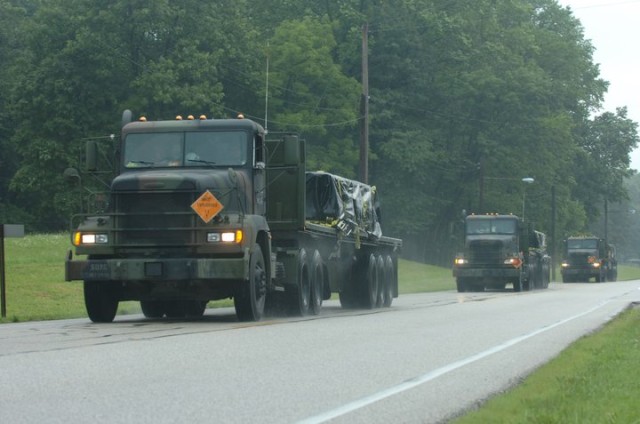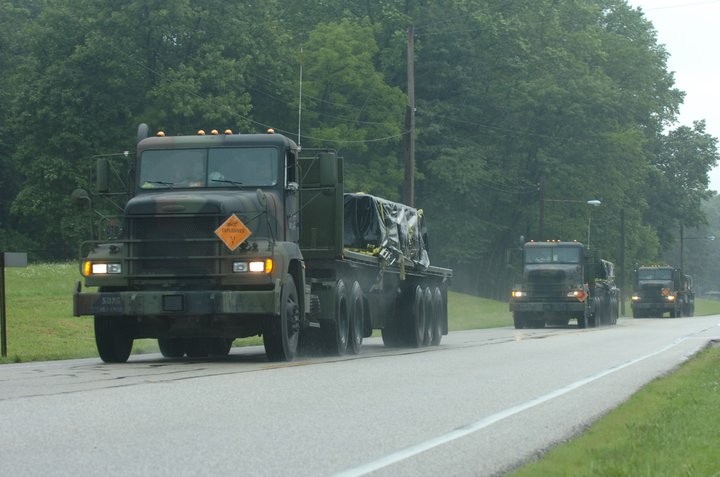CRANE ARMY AMMUNITION ACTIVITY, Ind. - The rumble of diesel engines, grinding of gears and crunching of gravel under massive tires filled the normally peaceful croons of wildlife in the woodlands of Crane Army Ammunition Activity for Operation Golden Cargo 2010. OGC is the premier annual training event for convoy operations. It took place in the heartland of America, up and down the highways and by-ways of the Midwest. Massive convoys rolled on the asphalt roads between CAAA, Blue Grass Army Depot, Ky. and Fort Leonard Wood, Mo. during this month-long simulation, in which large stockpiles of ammunition were transported between the three locations.
"Operation Golden Cargo gives Soldiers the opportunity to hone and sharpen their skills," said Lt. Col. Timothy Moody, 375th Combat Sustainment Support Battalion and OGC officer-in-charge. "Truck drivers who don't ordinarily get the chance to drive during battle assemblies are doing so here."
According to Moody, one of the critical training components of OGC is to give units from various places the chance to create combat-conducive chemistry, he said.
"All of the supporting units roll up together cohesively," said Moody. "This helps the Soldiers realize how they support each other."
One such Soldier is Pfc. Lucas Sevacko, a truck driver with the 846th Transportation Company, out of Salisbury, N.C. He has been in the Army for two years, has yet to deploy and is soaking up information here like an undershirt absorbing the sweat the ever-present mugginess and humidity produces, he said.
"At first, I was a little nervous," said Sevacko, of his participation in OGC, especially getting out on civilian roads. "There's been a little stress, but I've learned to rely on my truck commander. This way, I can keep my eyes on the road at all times while he makes sure everything else is clear."
OGC is giving Sevacko the opportunity to build upon the foundation of knowledge laid for him during Advanced Individual Training, he said.
"This is excellent experience for young drivers such as myself to learn how the trucks really handle out on the open road as opposed to the controlled environment of AIT," said Sevacko. "We know we have a critical mission in a combat scenario, because the troops can't operate and carry out there missions without supplies."
Another young Soldier taking full advantage of OGC is Spc. Ariel Bergeron, 375th Combat Services Support Brigade.
"I've been cross-training working here in the hub," said Bergeron, a full-time student. "I think every Soldier should be well-rounded."
Bergeron also had nothing but kind words for her OGC comrades.
"I think everybody working here is communicating very well," she said. "I'm with a great unit and I love the people I'm working with."
Spc. Michael Lynn of the 375th CSSB, echoed his colleague's emphasis on everyone being on the same page, he said.
"It's vital to have good communication all the way down to the smallest of details," said Lynn, intelligence, operations and communications non-commissioned officer in charge.
OGC provides outstanding experience for Soldiers of all military occupational specialties, from those out on the roads to those working at the tactical operations center, said 1st Lt. Jeramey Lacey, 375th CSSB operations officer-in-charge.
"This is some of the best training out there, in my opinion," said Lacey. "The fact it focuses largely on logistics makes it one of the better exercises."
Also coming into play is just what is being transported, he said.
"Soldiers can't get complacent when they're dealing with ammunition," said Lacey. "You have to be very focused."
Another aspect of OGC is from an economic point-of-view, said Col. Charles Kibben, CAAA commander.
"Not only is this great training for Soldiers, but the fact they're carrying out a real-world mission that needs to be done anyway is very cost-effective from our standpoint," said Kibben. "It would cost a lot more to hire contractors to do this."
Also, the fact the Soldiers of OGC are working alongside the CAAA civilian contingent is a valuable commodity, he said.
"We have a very experienced workforce here who can pass on valuable knowledge to the Soldiers," said Kibben. "It's important for Soldiers and civilians to be able to work together harmoniously and have the necessary synergy to support the war - we're one team, one fight."
However, for Kibben, the bottom line is not composed of dollars and cents, but of service to America, he said.
"What everyone is doing here is helping to keep this great country of ours safe," said Kibben. "I just really appreciate the Soldiers being here."
Lance Daters, CAAA Reserve Affairs, is the man whose task it is to ensure everything runs smoothly for Soldiers at the base camp.
"My job is to supply life support as far as running the compound is concerned," said Daters. "We try to fit what we do day in and day out to meet the needs of the mission. What we do here has a direct impact on the warfighter - this is just a phenomenal opportunity. It's a real pleasure to work with such true professionals and class Soldiers."
The Joint Munitions Command in Rock Island, Ill. is the sponsor of OGC, of which Col. Marc Klingelhoefer, the Chief of Staff, is in charge of 16 different ammunition depots. He underscored the importance of what the JMC does and how OGC assists with their mission.
"If the warfighter gets ammo, chances are it came from us," said Klingelhoefer. "For us, OGC serves an important purpose for us as well as providing training for Soldiers. This allows us to re-distribute our stocks and balance out what needs to go where. As far as the training aspect, this is the best you can get. It's a real-world mission right down to the planning, loading and driving - that's invaluable."
For Moody, in addition to the training OGC provides, it's also a welcome respite for himself and his fellow Soldiers, he said.
"Where else can you get up in the morning, get a cup of coffee and do something completely different than in your civilian life'" said Moody. "This is what I joined the Army for."


Social Sharing